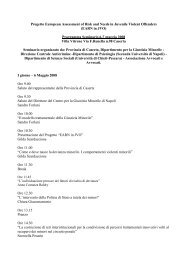Scarica il documento - Dipartimento per la Giustizia Minorile
Scarica il documento - Dipartimento per la Giustizia Minorile
Scarica il documento - Dipartimento per la Giustizia Minorile
You also want an ePaper? Increase the reach of your titles
YUMPU automatically turns print PDFs into web optimized ePapers that Google loves.
allegati<br />
with women-only groups at the portman. the groups have weekly sessions of an hour<br />
and a half. patients know each other only by first names, to protect confidentiality. the<br />
group therapist sees patients individually a few times before they join the group, but not<br />
afterwards. each patient is<br />
assigned a case manager who can see him individually to discuss particu<strong>la</strong>r issues.<br />
part of the tradition at the portman is to have some specialized groups: for example for<br />
paedoph<strong>il</strong>es, or patients with gender identity problems.<br />
adolescent or ch<strong>il</strong>d patients are only seen individually. the ex<strong>per</strong>ience at the Clinic<br />
indicates that in the context of an out-patient service young patients are harder to manage,<br />
they are more prone to acting out and do not respect the limits imposed by the group<br />
therapist, for example, not to have any social contact outside the group.<br />
Confidentiality<br />
the Clinic keeps a fundamental independence from the organs of the <strong>la</strong>w: that<br />
is, no information is given to the courts or the police in order to protect the possib<strong>il</strong>ity of<br />
offering a confidential treatment to the patient. Nevertheless, the explicit and basic attitude<br />
with which we work is of not colluding with the delinquent behaviour. some cases do not<br />
involve the <strong>la</strong>w, such as sado-masochistic practices between consenting adults.<br />
this is a controversial question and is the source of many intense discussions. it is an<br />
issue that is continually kept in mind and thought about at the portman. the main focus<br />
of our work centres on the unconscious of the patient, what interests us the most is his<br />
internal world. the external changes in the patient´s behaviour cannot be effected in a<br />
successful and <strong>per</strong>manent fashion unless there has been an internal change in the patient´s<br />
psyche.<br />
there are many risks in confusing the role of therapist with that of authority: it is<br />
essential for the patient that the therapist can sustain and defend his role as herapist,<br />
that he should not become the “victim” of the patient through manipu<strong>la</strong>tion nor give in<br />
to the pressure imposed by the authorities to disclose information about his patient. the<br />
patient can eas<strong>il</strong>y feel that the therapist is “ like all the others”: just another inquisitor<br />
whose sole interest is to interrogate him about his offence or <strong>per</strong>version, and who<br />
does not really care about the individual, his state of mind, his suffering or his <strong>per</strong>sonal<br />
history. this type of scenario in the mind of the patient can lead him to censor and direct<br />
his discourse to control the sessions or avoid disappointing the therapist. But he only<br />
succeeds in deceiving himself as well as others, and ultimately cheats himself of effective<br />
treatment.<br />
in this context, the work with ch<strong>il</strong>dren and adolescents poses particu<strong>la</strong>r problems<br />
and specific challenges: the ch<strong>il</strong>d and adolescent psychotherapist has both the legal and<br />
professional duty to give priority to the welfare of the young <strong>per</strong>son. there are countless<br />
problematic situations. For example, what happens when the patient is a ch<strong>il</strong>d who has<br />
abused or continues to abuse another ch<strong>il</strong>d? Who must be protected? What happens<br />
during treatment if an adolescent patient discloses that he is committing this type of<br />
offence? there are no easy answers. Within the Clinic there are divergent attitudes. John<br />
Woods, a colleague, has written about his work with adolescent abusers. in his book:<br />
246





